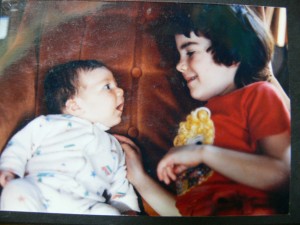|
|
June 17, 2011
 Maybe he's not so bad after all. Got email from a young dad who recently had a second baby. He and his wife were surprised at their 5 year old daughter’s reaction. “Emma clearly doesn’t like receiving less attention and has shown a change in behavior since the baby arrived. Thankfully she hasn’t taken it out on him, just directed it towards us.”
It was only 6 AM but Big Sister’s reaction was so familiar I skipped my starter cup of Earl Grey and immediately replied:
Hey Worried Dad,
If not classy, your daughter’s reaction is classic. During our son’s first 6 months, our daughter (also 5 at the time) was no ray of sunshine. Like your Emma, our girl never directed her resentment toward her brother, but she was obviously pissed at us… specifically me. Stands to reason. Five years she’s a mega star. Parents, grandparents, hell, even the UPS guys light up when they see her. She starts walking, talking and drawing pictures… OMG! Accolades pour in! That’s her life until… one day, Mom & Dad bring home a little blob in a blue blanket and bingo, Glory Days are gone.
From Child #1’s point of view, the arrival of #2 is the equivalent of Husband telling Wife, “Sweetie, I’d like to introduce you to my second wife. Isn’t she beautiful? And guess what? She’s going to live with us… FOREVER. I still love you, but you won’t be getting as much attention. We won’t be doing as much fun stuff together either. You see, my second wife has lots of needs so I’ll be focusing on her. When I’m with her, don’t interrupt us. If you do, I’ll probably get annoyed. I may even yell. Be quiet while she’s sleeping. And don’t bother me while I’m resting. Even though it looks like the coast is clear and I may be ready to spend time with you, I don’t have extra energy because it’s all going to… you guessed it, my second wife.
“What’s that? You’re not happy with these changes? You wanna know what you’re going to do about all this? I dunno. That’s your problem. Oh, one more thing… You must love my new wife as much as I do and share everything you’ve got with her. And don’t forget to smile. That’s very important. I want her to feel welcome.”
How would you feel if your one-and-only laid that on you?? OK, I see you’re starting to realize that Emma’s got a legitimate beef. Look, incorporating a new baby into the family isn’t an easy transition for any of you. Here are some suggestions that might help:
1) Acknowledge to Emma that her feelings of jealousy, resentment, etc. are TOTALLY VALID. Don’t make her feel like she’s “bad” if she’s not thrilled with the baby. While it’s OK for her to feel whatever’s she’s feeling, obviously it’s not OK for her to act out. Let her know that you guys get where she’s coming from then provide her with opportunities to express her feelings in responsible, appropriate and safe ways.
2) Dad, create special one-on-one time with your daughter. You and she deserve a weekly “date” outside the house, just the two of you. It will do wonders for your relationship and her behavior. Same with Mom and Emma. Insist they go off together once a week (at least for an hour or two) while you bond with your new son and give Mom a break.
3) Give Emma special “big sister” responsibilities. (No cleaning up or other yucky duties. Only the fun stuff!) Have her read to the baby. Sing to him. Draw pictures for his wall and let her explain the art to him. Show him how to play with his toys. Tell your daughter that her brother wants to get to know her. He’s curious about and impressed with all the things his Big Sister can do. He needs her to show him so much. Give her the opportunity to be one of his teachers and they will learn to love and appreciate each other.
It sure turned out that way with our little girl and her baby brother.

May 16, 2011
by Suzanna Narducci
Suzanna Narducci is an avid tweeter, blogger and co-founder of TweenParent.com. She’s always been fascinated by the evolution of an idea into a successful business. After an interesting but intense run in the fashion business, Suzanna decided to switch gears and become a mother. As Suzanna’s children grew, she realized that a reliable and consolidated resource for parents of pre-teens was missing in the marketplace. Suzanna shared her idea with her friend and now business partner, Judy King-Murray, and TweenParent.com was born. We’re so glad that it was!
 Give it back you little @#$%! At some point in their lives, most kids experience bullying of some type – whether it is in school, in the neighborhood, online or another social situation. The truth is most kids will not only be bullied, but will also harass other kids. For parents, the challenge is how to help their children develop the social skills they need to positively assert themselves in negative situations.
Fortunately, what children learn at home is transferable to their outside interactions. In a study published by the British Journal of Developmental Psychology, Dr. Ersilia Menesini and her colleagues at the Universita’ degi Studi di Firenze found that there was a direct correlation between sibling bullying and victimization and bullying and victimization at school. In short, the roles kids play out at home are likely to be reenacted with peers. According to the study, the children in families with high levels of conflict and low levels of empathy were at greatest risk. In light of these results, Dr. Menesini recommends that parents actively mediate when their kids start arguing.
Of course, it is normal for brothers and sisters to argue. However, parents can help their children learn to move forward in conflicts in a way that is not hurtful by actively teaching them skills to gain empathy while positively asserting their feelings. Here are some suggestions to help parents teach their tweens how to resolve arguments in a positive way.
- Listen and Reflect. Expect your kids to listen to each other’s point of view. Teach them to repeat back what they’ve heard from each other and explain why they think that their siblings feel the way that they do. They don’t have to agree, just understand.
- Avoid the Blame Game. Talk about how each person contributed to the situation, rather than placing blame. Start sentences with “I felt” rather than “you did,” to dissipate defensiveness.
- House Rules. Name calling, belittling, undermining and teasing by anyone in the family is not only hurtful, but also damaging to a child’s self-esteem. Kids begin to believe that negative comments that are consistently repeated about them – even in jest or teasing — are true.
- Keep Perspective. Developing a healthy relationship between siblings takes time. The end goal is to help your kids learn both how to constructively express their feelings and develop a better understanding of their siblings’ feelings. This won’t happen overnight, but by feeling that their needs are also being considered to resolve conflict, they will gain confidence and, hopefully, experience less aggression.
If all goes well, your kids will not only develop the skills they need to help them in their social lives at home and beyond, but will also recognize that this type of interaction is healthy and normal will help them have emotionally fulfilling and trusting relationships as adults.

April 19, 2009
 Give it back, you little #@#$%! I’ve grew up with two older brothers. I’ve still got ’em (which is a good thing) though obviously we don’t live together any more. And while the three of us are good friends now, I’d be totally lying if I said that when we were kids we always treated each other with kindness and respect. Not even close! There was a lot of arguing and fighting amongst us. Sometimes it got really loud and physical. Being the youngest and the only girl (and a very emotional one at that) I often felt angry and frustrated because Brother #2, The Master Tease, could instantly make me cry at any time. I hated that he was so good at pushing my buttons!
Thankfully we outgrew whatever nuttiness caused us to treat each other that way. So if you’re having problems with an annoying, bossy, mean or insulting brother or sister there’s hope that in the future things between you will be better.
But what can you do now if you and your sibling don’t get along with? That’s pretty much the email question I got today from this teen:
Hey Terra,
My older sister is very mean to me and I wonder why. She has ignored me so many times or mumbled something about me under her breathe. Once she threatened to push me down the steps. And when I sit beside her, she slides farther away from me. I don’t know why she treats me like this. I don’t even do ANYTHING mean or wrong to her! I would admit it if I did because that’s just how mature I am. I mean, she can treat me like this for the rest of our lives because I don’t care. I’m not close to her anymore. What is her problem with me? Why does she treat me this way?
Fed Up with Her

Dear Fed Up,
Your sister is the only one who can answer your question “Why do you treat me this way?” Have you thought of asking her? I want to warn you about a couple of things before you have this conversation…
Choose the where and when of this conversation wisely…
If your sister is with a friend or in the middle of something that’s taking all her attention or if she’s in a bad mood, that would NOT be a great time to have this kind of talk with her. My advice here would be to find a time when the two of you have some privacy and things between you are relatively calm. So, be smart when you pick the time and place.
Choose your tone of voice and your attitude wisely. If you come into a conversation in attack mode: “Why do you ALWAYS act so mean to me?!” “How come you’re NEVER nice to me?!” that’s going to put her on the defensive. And you two will probably not have a good conversation. Instead, stay calm, be respectful, and be honest about your feelings. You might say something like this, “You know, I was just thinking about the good times we used to have together… when we were younger. We always got along and I really loved having you as my big sister. And then, it’s like something changed but I’m not sure what. Have you felt that too? “
Then CLOSE your mouth and LISTEN to what she has to say. Don’t interrupt her. Don’t correct anything she says. Just be there and listen.
You see, this isn’t just about “Why does she treat me this way?” That would only concern her behavior. The real question you want the answer to is: “How did the two of us let our close relationship get to this point?” Both of you contributed to the slippage. The good news is that when you get that every relationship is a 2-way street then you can see that both people have a contribution to make in keeping it healthy.
You took the first step by writing to me. That was really honest and brave. Now the next step is for you to talk with your sister in the calm, private and respectful way I’ve suggested. Good luck!
In friendship,
Terra
It’s not realistic to think that brothers and sisters are going to get along all the time. That’s just not going to happen! But more peace and less fighting is a reasonable goal. What have you tried so far to make the peace with your sibling(s)? If you haven’t tried anything what’s stopping you from trying? If you’ve made an effort, what has worked? What hasn’t worked? Post your comments here.

| |















